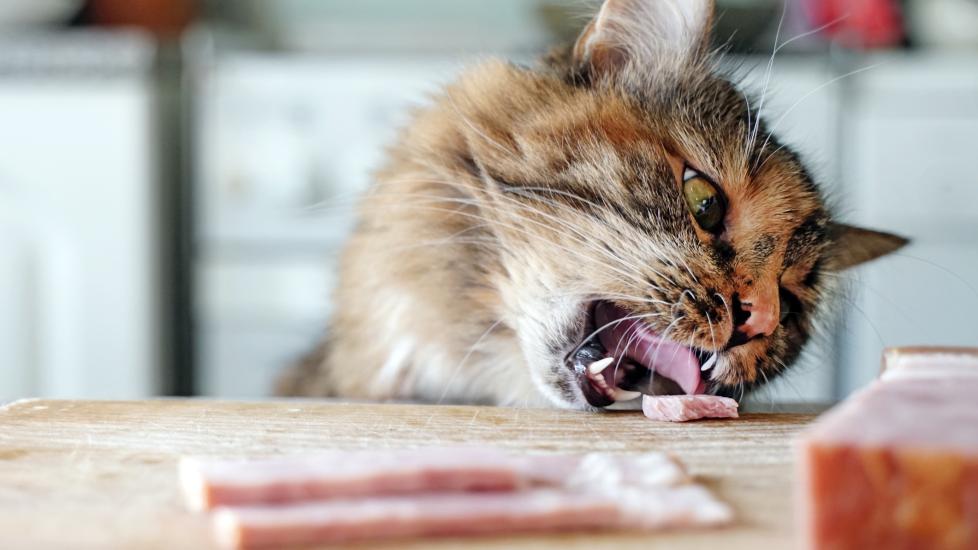Can Cats Eat Ham?
Ham is a holiday food and a favorite meat for quick sandwiches—but what about sharing with your kitty? Can cats eat ham, or should you skip this meat? While ham is a source of protein, there are some instances when your kitty should never snack on it.
Here’s what to know about safely feeding ham to your cat.
Is Ham Bad for Cats?
Cats are obligate carnivores, which means they are completely dependent on the nutrients found in meat products for their nutrition. Ham provides a lean source of protein, which is an ideal way to offer these nutrients.
However, not all ham is created equal. Although home-cooked ham is very good for cats, deli-processed ham foods are much less likely to be nutritious for cats. They frequently have lots of additives that can be bad for your feline companion, such as sodium and seasonings like garlic or onion, which are toxic for cats.
Although home-cooked ham is very good for cats, deli-processed ham foods are much less likely to be nutritious for cats.
So, if you want to share your ham with your kitty, it’s best to purchase raw, uncooked ham and then prepare it yourself without the addition of any seasonings or spices. This way, you will know that it’s safe and nutritious for you and your pets.
And, as always, check with your veterinarian beforehand to be sure that your cat is healthy enough to snack on ham.
Can Kittens Eat Ham?
Kittens fall in a slightly different category than adult cats when it comes to eating ham. Although they are still considered obligate carnivores and depend on animal protein-based foods for their nutrition, they have much more delicate nutritional needs and it can be difficult to make sure that all of the nutrients are being provided in the correct ratios.
For example, muscle meat (such as ham) is high in phosphorous but deficient in calcium. Eating too much muscle meat—although nutritious, lean, and high in protein—could actually affect the balance of calcium in a kitten’s body and affect the growth of strong, healthy bones.
A small bite of ham that has fallen on the floor isn’t going to hurt a kitten. But ham also isn’t something that should be regularly provided as a snack until a kitten has reached her full adult size. Additionally, a kitten’s digestive tract can be delicate, and she can develop concerns such as vomiting and diarrhea much more readily than adult cats.
How To Feed Your Cat Ham
If your kitty enjoys ham and you would like to add small snacks of it into her diet, it’s best to purchase raw ham and cook it yourself. Although this isn’t the most convenient—given the abundance of precooked, packaged, deli ham—it is by far the safest for your cat.
When cooking the ham, do not add any seasonings until after you have set aside a portion of fully cooked meat for your kitty. Raw meats can transmit a variety of different diseases, especially bacteria such as E.coli, salmonella, and listeria, so be sure any meats you feed your kitty are fully cooked.
How Much Ham Is OK for Cats?
Any ham offered should only be a 1-inch cube serving, no more than two or three times a week. Cut this portion into smaller bites, as your cat could potentially gulp down this tasty treat and choke.
Any ham that you offer your cat should be considered a treat and not a staple of their diet. Talk to your veterinarian before you start offering your kitty ham for treats, as not all cats should be offered ham. For example, cats on a sodium-restricted diet (such as cats with kidney disease or heart disease) may not be able to eat even small amounts of ham safely.
Many cats like to eat ham plain, or it can be used as a food topper. Another alternative is to help your cat get exercise in the process of getting her special treat by hiding the snack in a food puzzle or even in tiny portions in bowls around the house. This will make her more active while “hunting” for her snacks.
Any ham offered should only be a 1-inch cube serving, no more than two or three times a week.
As fun as it is to share ham with your cat, keep portion sizes small relative to the amount of commercial cat food she eats. It’s quite easy to give your cat too many treats, which can result in nutritional imbalances and illness. Remember: Even low-sodium hams still contain salt. Too much salt can lead to hypertension (high blood pressure) in cats, just like it can in people.
Can Cats Eat Ham Bones?
No, do not give your cat ham bones. In fact, all bones are off-limits for cats.
Bones pose many dangers. One of the most serious is if your kitty manages to break off a piece of bone. This can become lodged in the intestinal tract (causing an obstruction) or even puncture the stomach or intestines. And because a cat’s teeth are small and fairly brittle compared to a dog’s, they can break off a tooth while trying to bite the bone.
So, while cat tongues are designed to remove meat from bones, always keep bones away from your kitty.
Other Foods To Feed Your Cat
There are several other protein sources you can try offering that might be appealing to your cat. As long as they’re prepared properly, cats can have:
- Chicken
- Turkey
- Beef
- Fish
- Lamb
Remember: All meat for your cat needs to be fully cooked with the bones and skin removed. Keep portions small, and never add any seasonings or flavorings, as these could be harmful for your cat.
Featured Image: Getty/Natalia POGODINA
